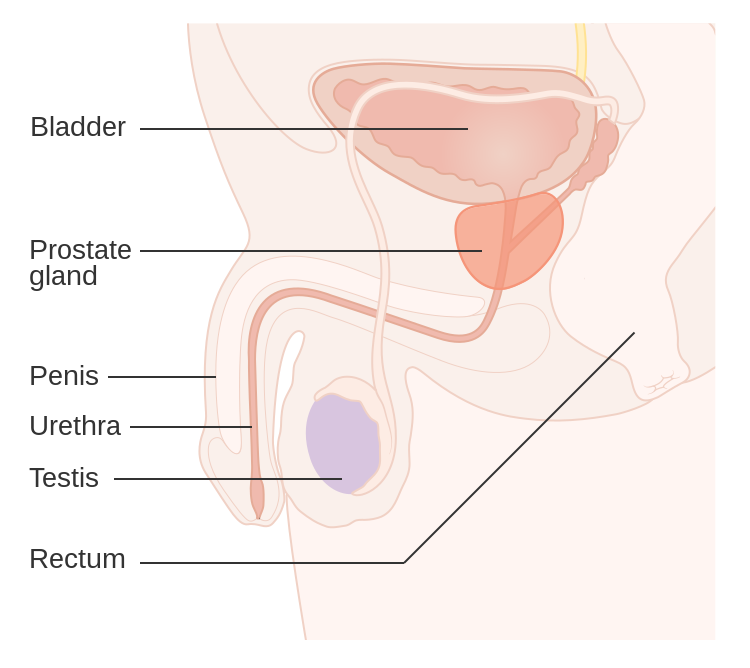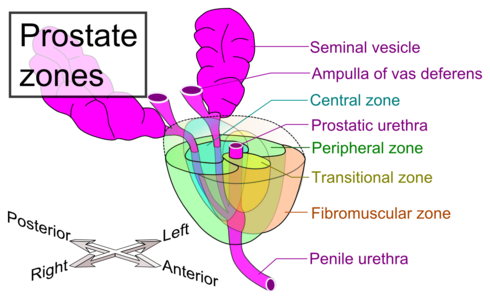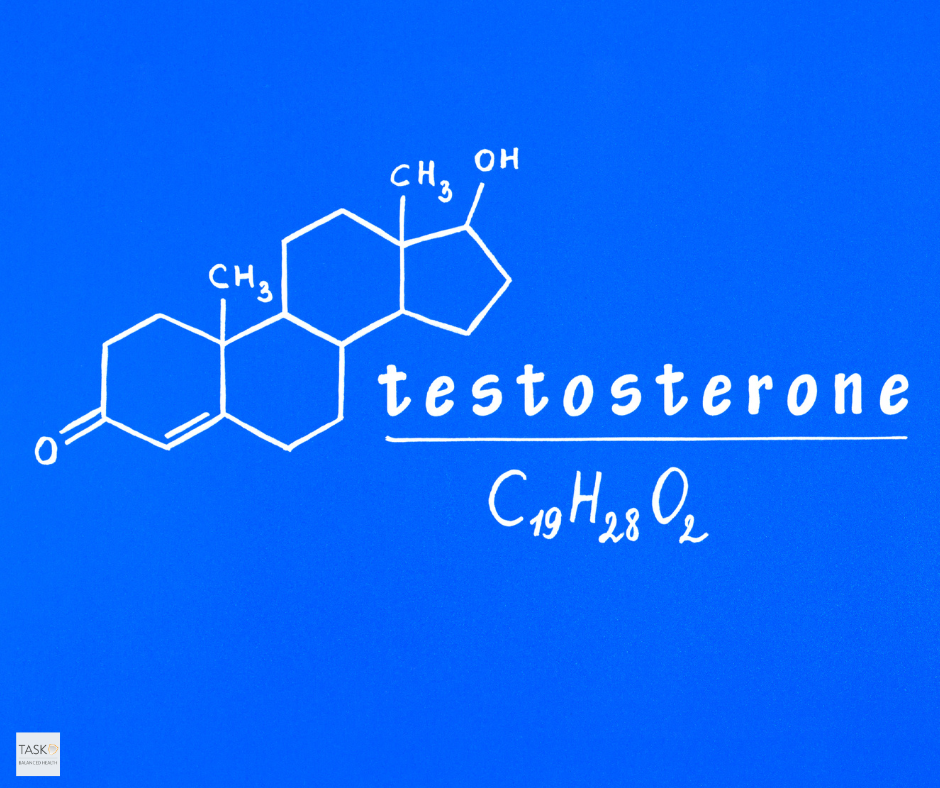Currently in the U.K., one in six men will be diagnosed with prostate cancer in their lifetime. Every man has a prostate although I find most don’t know how to look after theirs and prevent problems especially as they get older. This blog post will look at prostate problems and how Systematic Kinesiology can help.
Prostate function
Many men don’t know about the prostate’s function, what it looks like and where it is situated within their bodies. I also find that sometimes men don’t complain or go to the doctor with ‘health niggles’ as they don’t want to make a ‘fuss about nothing.’ This can be a major problem with the prostate as with time, ageing and no treatment, the imbalances could be getting worse and leading to the onset of disease.
Where is the prostate?
The word ‘prostate’ is taken from the Greek meaning “one who stands before,” which describes the position of the prostate gland. Viewed from below, where the urethra leaves the gland, the prostate stands before the bladder, but standing up just it’s just underneath the bladder.

What does the prostate look like?
It is round like a dinky doughnut, about the size of a walnut ( weighing around 1 ounce) AND interestingly the urethra runs through the centre of it. It has three layers, the innermost being the transition zone which is the smallest part surrounding the urethra between the bladder and the upper part of the urethra. The next layer is the central zone which surrounds the transition zone, this is where the ejaculatory duct lies. The final outermost layer is the peripheral zone which is the main part of the prostate gland.

Symptoms of an imbalanced prostate gland
As the prostate becomes inflamed/swollen it can tighten around the urethra causing problems with urination.
Symptoms of an enlarged prostate include
- Finding it difficult to start peeing
- Straining to pee
- Having a weak flow of urine
- Stop/start peeing
- Needing to pee urgently and/or frequently
- Needing to get up frequently in the night to pee
- Accidentally leaking urine (urinary incontinence to varying degrees)
- Finding it difficult to end the pee
What does the prostate actually do?
The prostate has various functions
- Fluid –Together with sperm cells from the testicles, fluid from the seminal vesicle and the secretions released by another pea-sized gland below the prostate (the bulbourethral gland), the prostate fluid makes up the semen. All these fluids are mixed in the urethra.
- Prostatic secretion is important for proper functioning of the sperm cells, and therefore also for fertility in men. The thin, milky liquid produced contains many enzymes such as the prostate-specific antigen (PSA). This enzyme makes the semen thinner to carry the sperm effectively.
- The prostate gland also secretes the hormone-like substance spermine which mainly makes sure sperm cells have good motility (ability to move)
- Closing off the urethra up to the bladder during ejaculation. During ejaculation, the prostate contracts and squirts fluid into the urethra. Here, it mixes with sperm cells and other fluids to create semen, which the body then expels.
When the prostate contracts during ejaculation, it closes off the opening between the bladder and urethra, pushing semen through at speed. This function makes it impossible to urinate and ejaculate simultaneously. The prostate is responsible for the male sex hormone testosterone being transformed into a biologically active form, DHT (dihydrotestosterone) which plays an important role in sexual development in males.
Hormone metabolism

The prostate is responsible for the male sex hormone testosterone being transformed into a biologically active form, DHT (dihydrotestosterone) which plays an important role in sexual development in males.
What are PSA levels?
PSA – Prostate Specific Antigen is a protein produced by the prostatic epithelium and periurethral glands. PSA is secreted into the seminal fluid in high concentrations and it is also found in low concentrations in blood. PSA levels can be monitored through a simple blood test with a doctor.
PSA levels under 4 ng/ml are generally considered normal, while levels over 4 ng/ml are considered abnormal. PSA levels between 4 and 10 ng/ml indicate a risk of prostate cancer being higher than normal. When the PSA level is above 10 ng/ml, the risk of prostate cancer is much higher.
The PSA is not a perfect test although if you know your levels then you can have regular checks to make sure it is not going up. PSA levels may also be high if the prostate gland is enlarged or inflamed which is much more common.
What can Systematic Kinesiology (SK) do for me and my prostate?

In the past, most clients were women and the men I saw were usually referred to me by their wives, mothers, daughters etc. However, we have seen a change over the last few years with more men wanting to come and be empowered by taking control of their health and well-being.
Within SK we have specific tests for prostate health (we do not diagnose conditions) to ascertain if there is any imbalance detected.
If an imbalance is found we have many ways of helping the body regain that balance including:
- stress release
- supplements
- specific lymphatic massage
- boosting energies around the area.
Interestingly, the main muscle related to the prostate is the Gluteus Maximus (main buttock muscle) which is connected to circulation and the male sexual organs. If this muscle is weak one can experience lower back aches (particularly when standing), an aching/uncomfortable urethra and also aching after sex or just a heavy feeling. We also look at the muscles around the bladder that can be affected and give discomfort from being weak or too tight.
Many clients have come to me quite anxious that something is amiss with their prostate (with or without symptoms) or they have been tested with elevated PSA levels and want to bring them down. I have never treated anyone with prostate symptoms or elevated PSA levels that have not improved significantly. It is always fabulous when blood tests reveal good work and levels become normal.
What can I do to look after my prostate?
Drinking enough water is essential for good prostate health especially as men tend to dehydrate quickly.
Taking a good omega 3 oil can be hugely helpful in keeping hydrated and also helping with any inflammation.
The herb Saw Palmetto can be wonderful for prostate health along with stinging nettle, green tea, zinc, cranberry and buchu, Vit C and Vit E to name a few.
Lifestyle changes can also be hugely beneficial by cutting out or back on processed foods, milk/cheese red meat and alcohol replacing them with plenty of freshly cooked fish, chicken, veggies, fruits and whole grains. And maybe give soda water go mixed with Biona cherry juice, it’s refreshing, good for you and delicious and can replace a glass of wine or beer.
Cutting out or back on smoking and upping the exercise of your choice. We suggest you do something you really enjoy so it’s not a chore. I personally don’t enjoy the gym so I don’t go. I do enjoy walking/jogging, rebounding, table tennis and swimming so that’s what I do.
I suggest getting all supplements tested by a Systematic Kinesiologist as what helps one person may do nothing for the next. We are all as different on the inside as we look on the outside. The above supplements and lifestyle changes can be fabulous prevention however also have a big part in helping to reduce symptoms and even PSA levels with SK treatments too of course.
Understanding the prostate gland and its functions is crucial for men who care for their well-being. By recognizing the importance of the prostate and taking steps to promote its health, we can potentially reduce the risk of complications and ensure a better quality of life.
Regular check-ups, healthy lifestyle choices, and early detection play vital roles in maintaining optimal prostate health, enabling men to lead fulfilling lives free from unnecessary discomfort or concerns.
So guys, if you do have symptoms, please do make a fuss about your health and go to the doctor to get checked out with a simple blood test, as prevention is better that cure. Also, with or without symptoms we may like to take our health into our own hands and see a Systematic Kinesiologist too.
Bring balance back into lives with Systematic Kinesiology
To find your nearest Kinesiologist please go to taskuknetwork.org